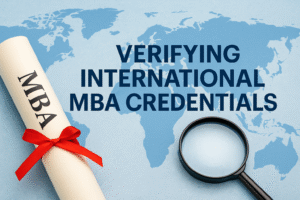
In today’s global talent market, the MBA remains one of the most recognized credentials for executive leadership. It signals advanced training in strategy, management, and decision-making. But not all MBAs are created equal, and in the high-stakes world of executive hiring, failing to verify a candidate’s international MBA can lead to costly mistakes.
For executive search firms, HR leaders, and compliance teams, verifying education is not simply due diligence. It is a safeguard against reputational damage, governance risks, and financial loss.
Why Verification Matters
At the executive level, credibility is everything. A candidate’s MBA is often viewed as proof of leadership readiness; however, there have been numerous cases where executives have falsified or misrepresented their educational credentials. When scandals break, the fallout can include resignations, shareholder mistrust, and millions lost in market value.
Global recruitment only increases this risk. An HR director in Europe may be tasked with evaluating an MBA from Asia or Latin America without deep knowledge of that education system. Without proper verification, it is easy to mistake a diploma mill for a reputable school, or to overlook differences in program length, rigor, or recognition.
Global Variations in MBA Programs
One of the biggest challenges is that MBA programs vary significantly across different regions.
- United States: Typically, a two-year program built on a four-year undergraduate degree. Heavy emphasis on case studies, internships, and accreditation by agencies like AACSB.
- Europe: Often one-year programs, streamlined for mid-career professionals. Many schools hold multiple accreditations (AMBA, EQUIS, AACSB), which assure global recognition despite shorter duration.
- Asia: A mix of U.S. and European models. In India, for example, many institutions award a Post Graduate Diploma in Management (PGDM), which is equivalent to an MBA when accredited nationally. Programs in China and Singapore often integrate local market expertise and language requirements.
Risks of Overlooking Verification
When international MBAs are not verified, the risks multiply. Diploma mills continue to operate worldwide, offering degrees with little to no academic rigor. Even within legitimate institutions, inconsistencies in program quality and recognition can create problems if employers assume all MBAs are equivalent.
For highly regulated sectors like healthcare, finance, or law, an unverified MBA can even lead to compliance failures. For executive search firms, a failed placement due to credential issues damages credibility with clients and delays critical leadership transitions.
Best Practices for Employers and Search Firms
- Confirm that the institution is accredited and recognized by national education authorities.
- Use professional credential evaluation services to determine equivalency with local standards.
- Request official transcripts or have the institution send verification directly.
- Train HR and compliance teams to spot red flags such as short completion times, unfamiliar school names, or vague program details.
- Document verification steps for governance and audit purposes.
Conclusion
Verifying international MBA credentials is not about mistrust; it is about ensuring quality. It is about ensuring that executive candidates have the education and preparation they claim. In a global hiring market where MBAs can vary significantly across regions, credential evaluation provides the clarity needed to protect organizations from costly mistakes.
For organizations navigating these challenges, partnering with experts makes all the difference. ACEI offers credential evaluation services that provide trusted evaluations, helping executive search firms, HR leaders, and compliance teams hire with confidence.
